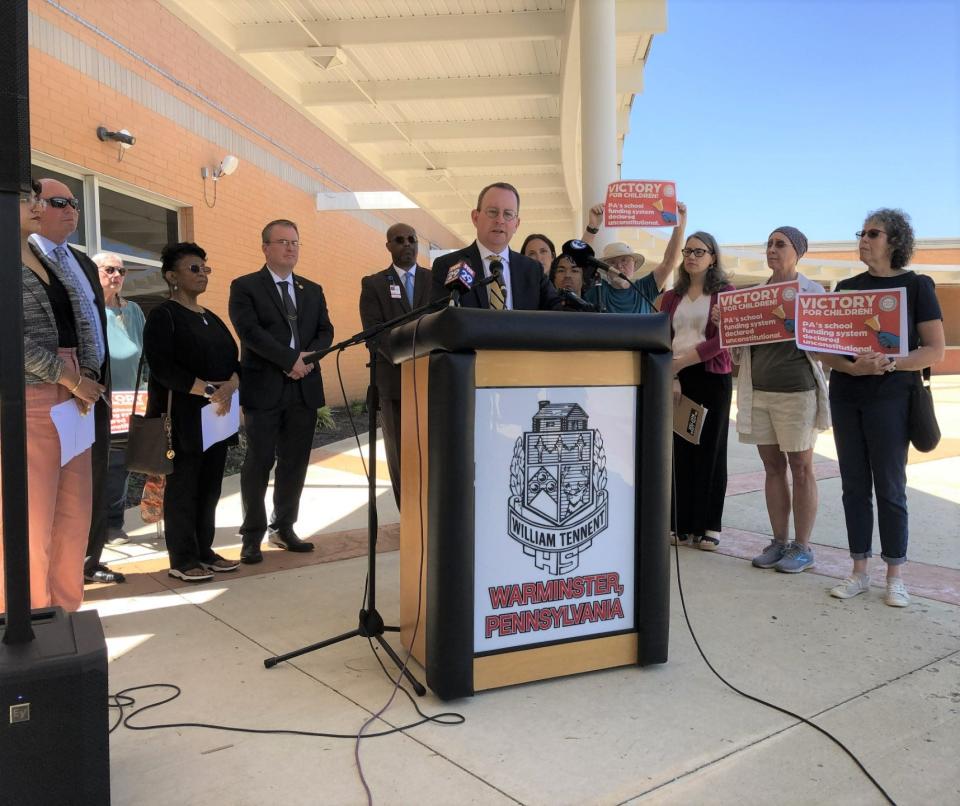'Crisis in education' requires more PA state funding, Bucks County school advocates say
Schools are facing a funding and personnel crisis. Pennsylvania needs to step up and do more to insure each child receives the same access to a quality education, and that already overburdened communities can receive some relief from ever-rising education costs.
A group of Bucks County school superintendents and other officials wanted to make that message known Thursday as they are asking Gov. Josh Shapiro and the state legislature to provide $1.236 billion from the state's $12 billion surplus to increase funding for education in the 2023-24 budget now being devised. The announcement was made during a press conference at William Tennent High School in Warminster organized by the advocacy coalition Children First.
In his budget proposal, Shapiro wants to increase basic education funding for kindergarten through 12th grade schools by $567.37 million. But Children First is asking for $700 million, and another $300 million for the 100 lowest wealth districts, as well as an additional $236.5 million for special education, said Priyanka Reyes-Kaura, the group's policy director for K-12 education.
PA school funding formula flawed: Court
In February, Commonwealth Court ruled that the state's educational funding formula was flawed because it didn't assure that each Pennsylvania child gets equal access to a quality education and this went against the state's Constitution guaranteeing equal protection under the law.
The school officials acknowledged that Shapiro wants to make education a priority in the state's budget for next year, but they don't know yet whether the legislature will go along. They are pressing legislators to provide the districts more funds from the state's expected revenue surplus both to increase educational equity for all students and to provide relief for homeowners who are facing hardships because of the rise in local school taxes.
Why have education costs gone up for Bucks County schools?
The superintendents said a combination of factors including more children needing special services and fewer teachers, counselors, aides and bus drivers available since the pandemic started, are affecting educational programs in schools and have raised staffing costs. Coupled with inflation increasing the price of educational supplies and building materials, these expenses have left districts searching for new ways to fund their budgets without property tax increases each year.

State Rep. Brian Munroe, D-144, of Warminster, said Thursday in the six months since he's taken office as a legislator, he's participated in 30 meetings and phone calls about educational issues and two topics keep coming up: funding and personnel. He is now a prime sponsor of House Bill 1249 which would provide a tax credit to those who become teachers as well as new police officers and nurses, two other public service occupations facing employment shortages.
"We're facing a crisis in education," Munroe said a constituent who visited his office told him recently.
The man specifically wanted to know what efforts were being taken to boost educational and good nutritional development starting in pre-kindergarten, so that children would have a good start in school, both academically and physically.
Bucks County schools are seeing more needs in students
More: Pennsylvania teachers leaving their jobs at an accelerating rate, new study finds
Centennial School District Superintendent Dana Bedden said his district has seen its number of homeless children rise from 38 to 100 in the past two years and Centennial joins several other districts in seeing an increase in the number of immigrant children needing English as a Second Language instruction. He said the district now has students coming from 48 different countries and speaking 40 different languages.
Bensalem School District has the third most diverse student population in Pennsylvania.
"We are incredibly proud of our diversity," said Superintendent Samuel Lee, but the district must fund language educators and also fund a charter school within its boundaries, which takes about 10% of its budget. "These issues are real," Lee said.
Lee said Bucks County school districts are "incredible stewards of taxpayer investments but communities are made to bear significant burdens."
ZIP code a factor in PA school funding
Karen Downer, president of the Bucks County Chapter of the NAACP, said that a child's ZIP code largely affects their access to a quality education. "Local wealth determines which students get what they need," she said, since the majority of educational funding comes from local taxpayers.
She said it is unfair children in poorer communities do not have the same access to educational services and extracurricular activities as those in richer school districts.
While the New Hope-Solebury School District is located in one of Bucks County wealthiest communities, it has seen its costs "deeply exasperated by the pandemic, said Superintendent Charles Lentz, including a rise in special education needs which account for one-eighth of its $48.3 million in expected expenditures for the 2023-24 school year.
Like other districts, it has had a tough time recruiting teachers and support staff. Lentz said the district relies on its local taxpayers to fund 83% of its budget and it is difficult to ask them to fund more.
Two Tennent students, Emma Torok and Jamal Mitchell, both said that increased funding must level the playing field for all Pennsylvania students both in classrooms and in extracurricular activities.
Rabbi Anna Boswell-Levy, a parent of children in the Pennsbury School District, said she too is concerned that the state is not doing enough to help ease the burden on local communities to provide quality education for their students.
"Pennsylvania has long underfunded our schools ... Each of these kids are our future, our hope, our investment," she said.
Bedden concluded, "If you think education is expensive, I assure you ignorance is more expensive."
This article originally appeared on Bucks County Courier Times: PA school funding needs fix for Bucks County schools

